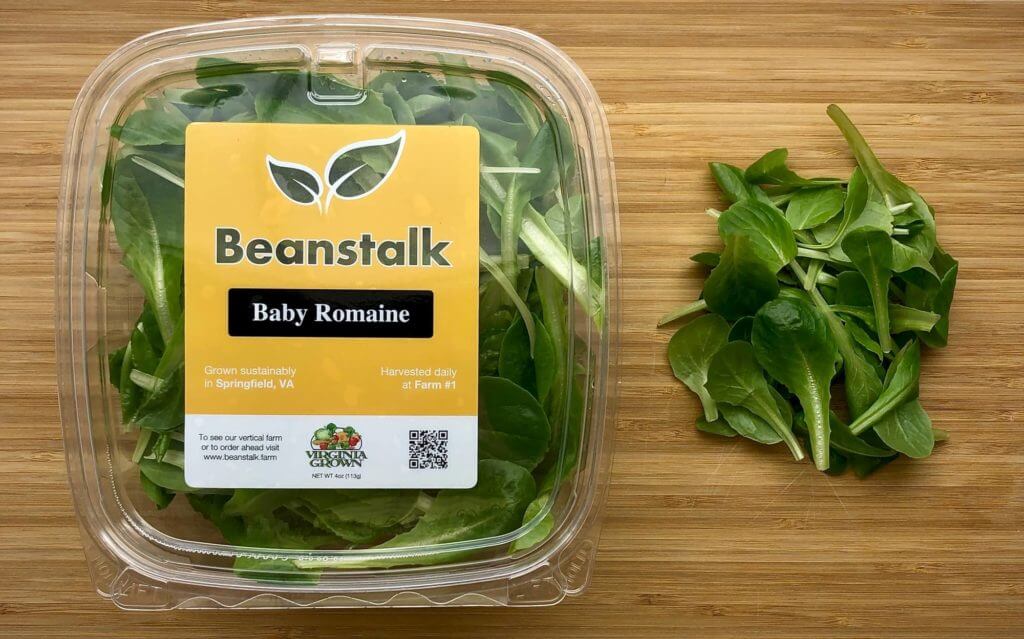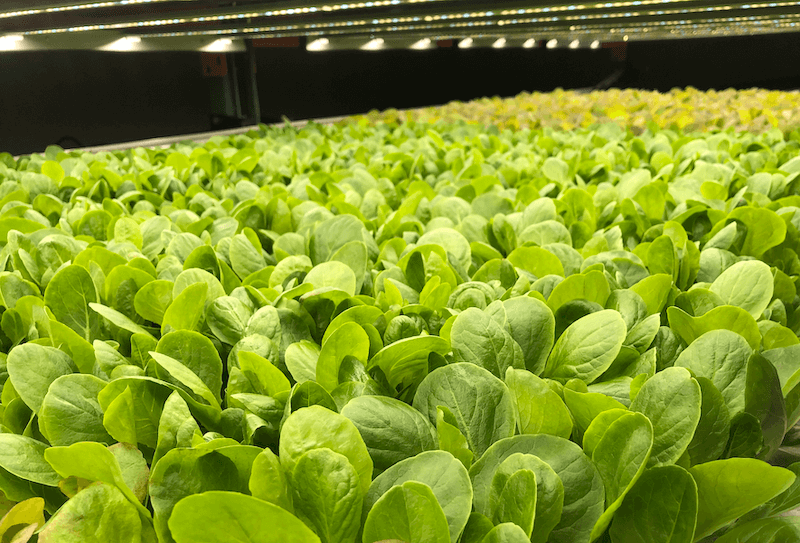Beanstalk — a different kind of farm in Fairfax County
It doesn’t much look like a farm, at least in the traditional sense. But that’s kind of the point.
Beanstalk, wedged into a 3,000-square-foot industrial space near Interstate 95 and the Fairfax County Parkway in Lorton, might very much be the farm of the future – an environment where biology meets engineering to advance local food production.
Founded by brothers Mike and Jack Ross, Beanstalk is on a mission to create sustainable and healthy local produce through advancements in biology, hardware and software. The brothers have even engineered their own robotic devices to help produce racks of veggies including romaine, arugula and kale.
“Beanstalk grows pesticide-free, heirloom produce all year round,” says Mike Ross, an aerospace engineer who studied at Georgia Tech. “We harvest at peak freshness and peak flavor and we deliver all of our products within 24 hours of harvest from our vertical farm. Our product is healthier because it is eaten much sooner after it is harvested.
“Because we grow indoors, we control the climate so that the growing is always optimum. We use purified water – which we recycle – clean light and organic nutrients to grow all of our produce.”
Beanstalk is aiming to make a big impact despite its tiny footprint. Walk through the small lobby and one immediately enters the workshop area, where the brothers have turned their technological ideas and mechanical expertise into devices to produce better products more expediently.
Beyond the shop area, encompassing slightly more than half of the farm’s space, is the darkened growing area, where greens and herbs are currently growing in trays, placed in tall racks on either side of the room. This is where the seeding, irrigation, monitoring, harvesting and short-term refrigeration all take place.

Baby Romaine lettuce is just one of several products Beanstalk is growing indoors at its Lorton facility. (Photos, Beanstalk)
“The growing room is the replicable part of the farm, where we tightly control the air chemistry and the water chemistry that we use for irrigation,” Mike Ross says. “Beanstalk is a ‘vertical farm.’ That means it’s simply a farm that utilizes all three dimensions. We grow horizontally as well as vertically.”
The secret to sustainability is in the equipment. For instance, those aren’t just any trays to grow the plants. Those are part of the proprietary Blu Tray System, which enables Beanstalk to grow a variety of crops in the same space, using the same machinery. The machinery remains stationary while the plants move through the growing process.
LED lights, climate controls and nutrient systems are all part of the process. Beanstalk says its hydroponic process uses 95 percent less water than crops would require in a field. And Beanstalk uses reverse osmosis filtration to ensure that the water is always pure and the plants are always healthy.
“The way we look at our technology here, it’s a marriage between the most advanced tech in greenhouses and the most advanced technology in distribution and fulfillment,” says Jack Ross, 23, who studied computer engineering at the University of Virginia. “All of our machinery, robotics and software is built here at the farm. Since we’re building our farms inside of distribution centers, we have to adapt the latest growing technology that greenhouses are using…and with shelving stacked 20 to 30 feet high, combine that with material handling equipment from the warehouse industry. Where those two meet is where we build all of our own proprietary technology.”
Among the devices Beanstalk has created is a machine that automates the seeding process (“Much faster and more accurately than the human hand,” says Jack) and a gravity-based irrigation system that carries 13 nutrients that plants need for healthy growth. Beanstalk also monitors a range of environmental factors including humidity, temperature and CO2 in the air.
As important as the cutting-edge technology is to the product, Beanstalk’s success is highly-dependent upon its location in Fairfax County and the ability to put fresh product in the hands of its consumers on a timely basis.

Beanstalk lettuce growing under LED lights.
“Our location is all about utilizing urban space and getting as close to the consumer as possible,” Mike Ross says. “We retrofit a distribution center so that we are located near the populous. Being right on the Fairfax County Parkway and 95, we are both easily accessible to the consumer as well as part of a major distribution hub to the D.C. area and some other cities.”
Moreover, Beanstalk has found its Fairfax County location to be beneficial as an innovative startup.
“When I think about Northern Virginia, I think of the network, that it’s an area in which both business and social ideas spread very quickly,” Mike Ross says. “When we started talking about what we were going to do and started asking for help, we got to meet all kinds of people…and a lot of companies that helped us meet some of the challenges in starting a business as well as connecting us to customers and investors.
“There are a lot of interesting people [in Fairfax County] that are honestly trying to make a difference. It’s an area of opportunity, and one of the healthiest areas to live in America.”
Beanstalk is selling direct-to-consumer, thanks to subscribers who have signed up for weekly programs for its red and green romaine, baby kale and farm-mix products. The company is testing its Swiss chard, and is about to start growing spinach. Beanstalk is thinking about berries and about larger distribution partners and additional farm locations.
“In a few years, we do expect to be a major supplier of pretty much anything you would find in the produce section, anything that’s going to have nutritional value or make a certain dish pop,” Mike Ross says. “We’re going to expand with some pretty-fun and different foods.”